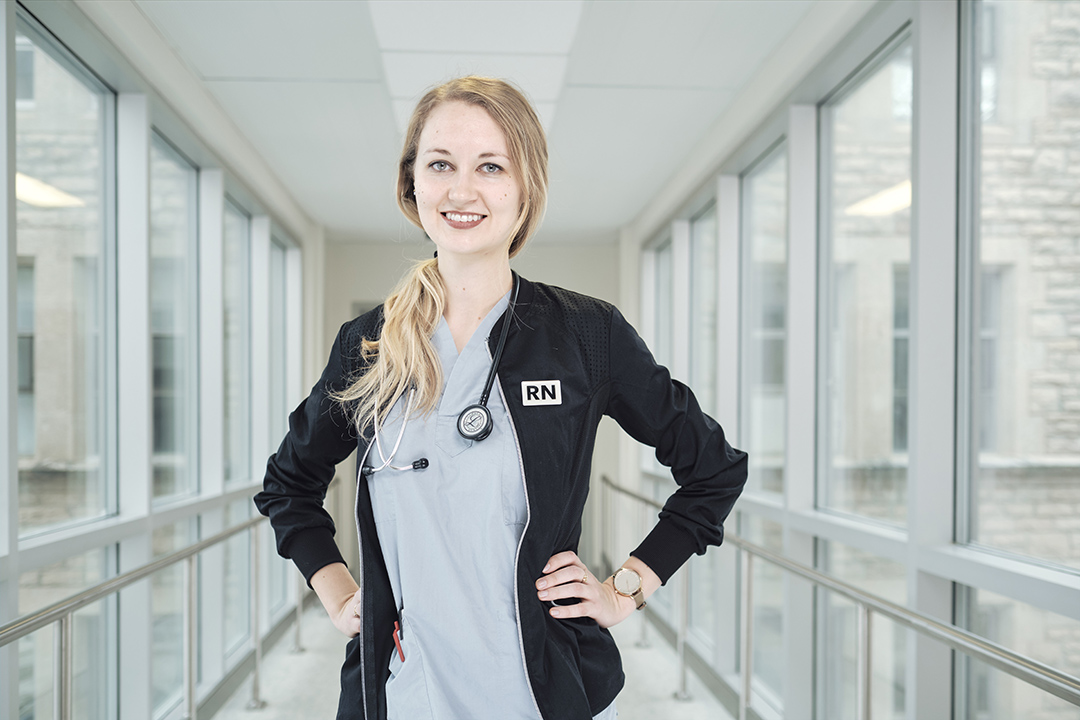
Nemetchek grows as a nurse through graduate studies
Once Brooklyn Nemetchek earned her Bachelor of Science in Nursing in 2016, she knew she’d probably carry on with graduate studies. She just didn’t know when, where or how. “I’ll just work and figure it out,” she told herself.
By Cory Leyte“I absolutely love the field of global health,” said Nemetchek, whose faith-based upbringing encouraged serving others.
So, she immediately jumped at the offer after graduating when she got a chance to volunteer in Uganda for three months with a collaborative University of Saskatchewan (USask) research program.
The collaboration, led by the late Dr. Adil Nazarali of the College of Pharmacy and Nutrition, focused on pediatric mortality in Uganda, a country with extreme poverty and scarce medical supplies and resources in hospitals. A study found that five per cent of children die after admission and the same number die within six months of going home.
“There’s no follow-up, no census about what’s going on in the homes,” Nemetchek learned.
As she dove into her work, she found herself getting immersed in the culture.
“I really love Uganda,” she said.
While overseas, Nemetchek discovered another passion: cross-disciplinary collaboration.
“I loved working with so many different doctors and nurses,” she said.
Back in Canada, Nemetchek still had no tangible grad studies plan.
“But then I spoke with Adil,” she recalled. “It was a very short conversation. I asked him what he’d think about me going back (to Uganda) to continue volunteering. And he said, ‘Great. Do you want to do your master’s while you’re there?’ Next thing I knew I had the visa, a project to work on, and I was gone.”
The Saskatoon born-and-raised Nemetchek was about to learn that graduate studies at USask can be self-directed, flexible and relevant to her passion.
While she weathered patchy Internet service to complete her coursework via distance learning during her additional six months in Uganda in 2017, she managed to conduct a new phase of the original research, this time targeting infant mortality. She turned that into her master’s thesis, Pediatric Infectious Disease in Resource-Limited Settings: Describing Post-Discharge Mortality in Uganda. Her master’s took just 14 months between conception and thesis defence in 2018.
“I did my research with the team; either I’d go to their office or work in hospitals during the day,” she explained. “Those broad experiences made it so much easier to actually integrate the formal learning I was doing at the same time.”
Nemetchek said she recognizes that her opportunity to do her graduate studies was “literally placed in front of me.” She’s grateful for that and encourages others who are considering a master’s degree to look at what the College of Nursing offers, with graduate studies individually tailored. Nemetchek said the mentorship she received through both Dr. Matthew O. Wiens (PharmD) as project research head from the International Centre for Child Health, and Dr. Susan Fowler-Kerry (PhD) as her supervisor from the College of Nursing, were invaluable in her growth, learning, and experience.
“The College of Nursing has a lot of options to get an MN (Master of Nursing),” she said. “I say figure out what your interest is. You can reach out across the university, to, say, pharmacy, or public health.”
In addition to overseas opportunities, the College of Nursing allows students to study where they live. In May, Nemetchek is off to the School of Tropical Medicine in Liverpool for a three-week course that is a prerequisite for working with organizations like Doctors Without Borders, as well as Samaritan’s Purse.
After that, she wants to work in East Africa. For Nemetchek, the challenge of nursing in Africa makes her feel like she’s doing something worthwhile and working for something greater than herself. And that’s precisely what she is looking for.
“I love experiencing new things,” she said. “And I’ve become a better nurse.”

